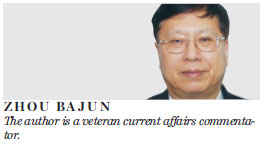Public support crucial in realizing universal suffrage
Updated: 2015-04-15 07:57
By Zhou Bajun(HK Edition)
|
|||||||||
Next Wednesday, the Hong Kong SAR Government will release its proposed methods for electing the Chief Executive (CE) by universal suffrage in 2017. The proposal is certain to comply with requirements of the Basic Law and the National People's Congress Standing Committee's (NPCSC) Aug 31 decision. The SAR has now entered the final stage of consultations on the constitutional reform for the election of the CE by a "one person, one vote" system in 2017. Whether the proposal is passed depends on the Legislative Council (LegCo), more precisely, on opposition lawmakers.
Since early 2013 when the issue of the 2017 CE election began to come to people's attention, the opposition has adopted the cause of so-called "genuine universal suffrage". Some have argued that the central government should compromise with them in order to realize the target of universal suffrage in 2017.
However, the Basic Law clearly outlines what qualifies a person to stand for election and fill the post of CE.
To conform to Article 43 of the Basic Law, the CE should be accountable to the central government and the HKSAR. Therefore, anyone who opposes the central government does not qualify for the post of CE.
The methods embodying the above mentioned principles for the election of the CE by universal suffrage should be "specified in the light of the actual situation in the HKSAR and in accordance with the principle of gradual and orderly progress".
Based on the current political situation in Hong Kong, the SAR government is expected, on the one hand, to lower the "threshold" for first round of nomination within the Nominating Committee (NC) to give opposition candidates a chance of running for election as CE, while on the other, insisting that any candidate for the post obtains the support of at least half of the NC members, in order to ensure that no unpatriotic candidate will be able to stand for election as CE. This mechanism is essential for maintaining Hong Kong's constitutional status as a SAR of China.
The majority of Hong Kong people look forward to having the political right to elect the CE in 2017 by a "one person, one vote" system. They also want the leader of the SAR to be accepted by the central government. Even the US government has expressed the desire for the election of the CE in 2017 to be based on the NPCSC decisions.
Now the political "ball" is in the opposition lawmakers' court. Some of them privately hope the government's proposals are accepted. But they have concerns too. These include the possibility of losing votes in district council elections later this year and LegCo elections next year; concerns about loosing political face; and also fears of a serious split among opposition groups.
The authorities and pro-establishment organizations are expected to launch massive campaigns to mobilize and motivate public support for the government proposal. Arguably this is crucial for getting some opposition lawmakers to change their decisions and vote for it.
Ever since the 79-day "Occupy Central" protests last year, irreconcilable contradictions between the opposition camp and the "Love the Nation, Love Hong Kong" camp have worsened. Accordingly, Hong Kong people have become divided.
There is obviously a difference in political interests between Hong Kong people and opposition lawmakers, and between local opposition and their leaders. Some opposition lawmakers have admitted they face a dilemma: Neither a vote for, nor a veto against the government proposal would be good for the opposition camp. However, they still prefer to reject, rather than to endorse it.
Hence, any campaign to mobilize and motivate public support should aim to accurately expound government proposals for the 2017 CE election. It's critical for the SAR's constitutional reform to be strictly based on the Basic Law and the relevant decisions of the NPCSC. This is the only one way to achieve universal suffrage in the SAR.
It is hoped that the government proposal will be passed by LegCo. But many believe that even if the opposition derails the proposed package for the election of the CE by universal suffrage in 2017, the SAR's constitutional development will still accelerate in the foreseeable future so long as the majority of Hong Kong people appreciate that opposition dreams of introducing Western political models into the SAR will never happen.

(HK Edition 04/15/2015 page10)